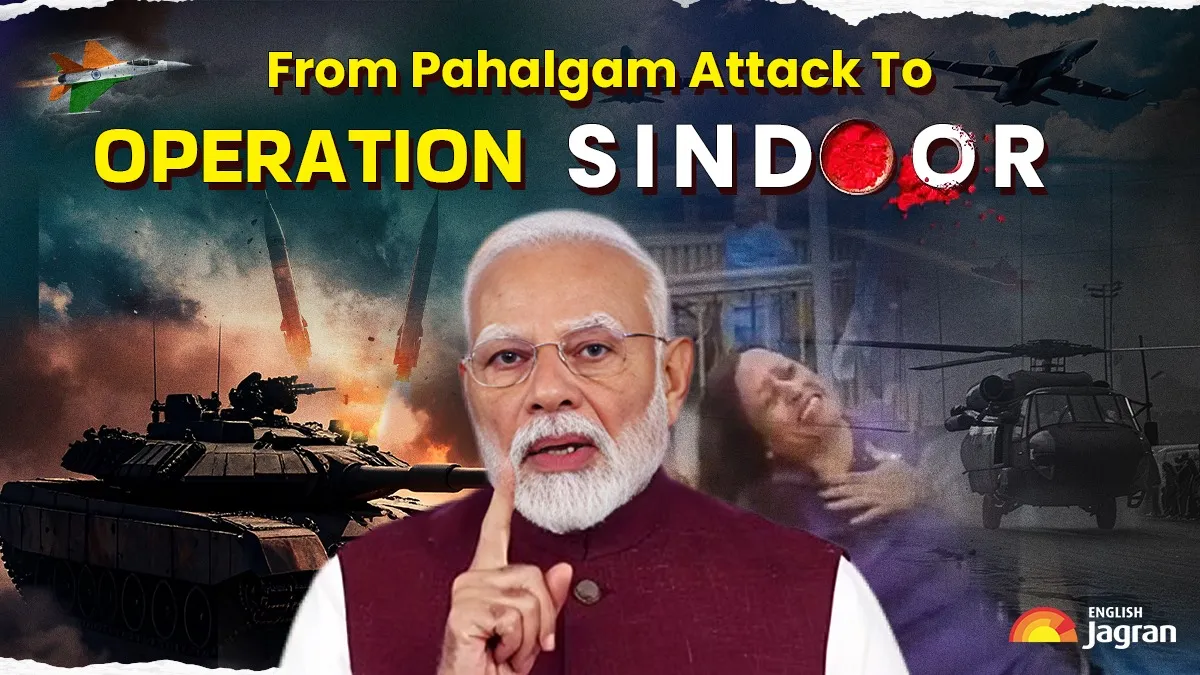- By Priyanka Koul
- Tue, 13 May 2025 04:57 PM (IST)
- Source:JND
Tensions between India and Pakistan remain high despite a surprise ceasefire agreement reached on Saturday. Within hours of the announcement, the Pakistan Army allegedly attempted to target Indian cities in Jammu & Kashmir and Rajasthan using drones and missiles. The Indian Army responded swiftly and effectively to these provocations.
In his first address to the nation following the launch of Operation Sindoor, Prime Minister Narendra Modi confirmed that the operation remains active. He firmly stated that India "will not tolerate any nuclear blackmail," reiterating the country's strong stance against terrorism and its state sponsors.
Address to the nation. https://t.co/iKjEJvlciR
— Narendra Modi (@narendramodi) May 12, 2025
Just minutes after PM Modi's 22-minute speech on Monday, 12 May 2025, reports of drone activity surfaced near the International Border in Jammu’s Samba district and Punjab’s Jalandhar district.
The Indian Army urged the public to remain calm, assuring that the situation is under control and that security forces are actively tracking and responding to suspected drone movements in the affected areas.
These events have raised uncertainty about future developments. The conflict has been intensifying since the Pahalgam terror attack and escalated significantly with the launch of Operation Sindoor, as Pakistan still continues to violate the ceasefire agreement.
Timeline of Events
April 22: On April 22, terrorists affiliated with The Resistance Front (TRF)—an offshoot of Pakistan-based Lashkar-e-Taiba—carried out a brutal, religion-based targeted killing of civilians in Baisaran Valley, Jammu and Kashmir. The attack has been widely condemned as a grave act of terror aimed at deepening communal divisions and destabilising the region.

Image Credits: ANI
In response, Prime Minister Narendra Modi cut short his official visit to Saudi Arabia and immediately returned to Delhi, where he convened a meeting of the Cabinet Committee on Security (CCS).
Following the high-level meeting, the Indian government announced a series of strong retaliatory measures as part of the first wave of punitive action against Pakistan:
- Downgrading diplomatic ties
- Expulsion of Pakistani military envoys
- Suspension of the Indus Water Treaty
- Closure of the Attari land transit point
- Withdrawal of Indian defence, navy, and air advisors from the High Commission in Islamabad
ALSO READ: 'Valley In Pain': Kashmiri Locals Plead For Peace As Tourism Crumbles After Pahalgam Attack
April 23: India officially suspended the Indus Water Treaty and revoked short-term visas issued to Pakistani nationals (excluding diplomatic personnel). Meanwhile, Pakistan began violating the ceasefire.

Image Credits: ANI
April 24: Pakistan responded by suspending all bilateral agreements, including the 1972 Simla Agreement, ending trade with India, and closing its airspace to Indian flights.
April 25: An all-party meeting was held to brief the opposition on India’s military preparedness and diplomatic steps.
April 29: PM Modi chaired a high-level meeting with the Defence Minister, CDS Gen Anil Chauhan, and service chiefs. The armed forces were granted complete operational freedom for retaliation.
April 30: India closed its airspace to Pakistani flights.
May 2: India banned all imports from Pakistan. A DGFT notification prohibited import and transit of Pakistani goods, even through third countries.
May 3: Indian ports and waters were closed to all Pakistan-flagged vessels and boats.
May 7: Operation Sindoor was launched in the early hours (around 1:40 am) to avenge the Pahalgam attack. Multiple terrorist infrastructure sites in Pakistan’s Punjab province and Pakistan-occupied Kashmir were struck. Over 100 terrorists, including Masood Azhar’s family members and the IC-814 hijacking mastermind, were eliminated.

May 8: Pakistan launched an aerial offensive using 300–400 drones — including Turkish Asisguard SONGAR models — on 36 Indian cities, alongside cross-border artillery fire. India responded with counterstrikes and successfully neutralised airborne threats.
May 9: India retaliated by targeting Pakistani military bases and destroyed Lahore’s HQ-9 air defence systems. Pakistan launched further attacks with swarm drones, loitering munitions, and Fatah missiles targeting 26 Indian locations. India intercepted most of these and hit back with precision strikes.
May 10 (Morning): The Indian Air Force targeted eight Pakistan Air Force bases, including Rafiqui, Murid, Chaklala, Rahim Yar Khan, Sukkur, Chunian, Pasrur, and Sialkot.
May 10 (Afternoon): US Secretary of State Marco Rubio held talks with PM Modi, NSA Doval, and their Pakistani counterparts. Subsequently, DGMOs of both nations communicated and reached a ceasefire understanding.
May 10 (Evening): Pakistan breached the ceasefire agreement by launching another wave of drones and opening fire.

Image Credits: PTI
May 12 (Afternoon): DGMOs from both countries spoke again at 5 PM and agreed on immediate steps to reduce troop deployment along borders and forward areas.
May 12 (Evening): In his national address, PM Modi declared Operation Sindoor as India’s new counter-terrorism policy, stating, “India will not tolerate any nuclear blackmail.” He emphasised that the operation was still ongoing and asserted that India has established a “new normal” — responding to terrorism in a language terrorists understand.
Zero tolerance against terrorism is the guarantee of a better world: PM @narendramodi pic.twitter.com/O6LJdSzNjF
— PMO India (@PMOIndia) May 12, 2025
May 12 (Night): Drone sightings were reported again near the International Border in Samba and Jalandhar. The army confirmed the situation was being effectively managed.
May 13 (Early Morning): A gunfight broke out in Shopian district, Jammu & Kashmir, following specific intelligence about terrorist presence in the Shukroo Keller area. Security forces initiated a cordon and search operation, which escalated into an encounter.
May 13 (Afternoon): The Indian Army launched Operation Keller, a search-and-destroy mission based on inputs from a Rashtriya Rifles unit. In the ensuing gunbattle, three hardcore terrorists were eliminated.
OPERATION KELLER
— ADG PI - INDIAN ARMY (@adgpi) May 13, 2025
On 13 May 2025, based on specific intelligence of a #RashtriyasRifles Unit, about presence of terrorists in general area Shoekal Keller, #Shopian, #IndianArmy launched a search and destroy Operation. During the operation, terrorists opened heavy fire and fierce… pic.twitter.com/KZwIkEGiLF
